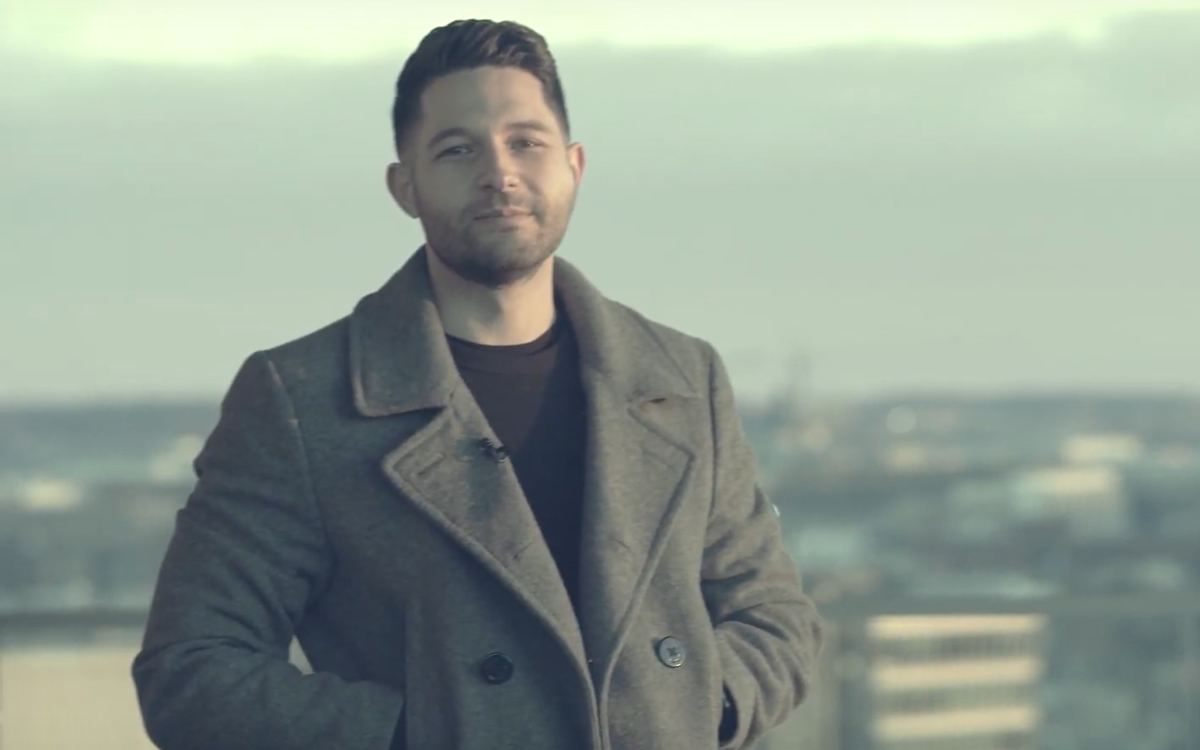Opinions
Walking D.C.’s Ward 1 with Salah Czapary
Would restore much needed LGBTQ representation to the Council

The first time I met with Salah Czapary I could barely hear what he was saying. Granted, it was a busy wine patio just off U Street on a crisp spring night, and no one likes drinking outside more than Washingtonians. But the incredible roar of ATV vehicles and dirt bikes up and down the thoroughfare could best be described as constant.
Our second meeting was much more agreeable. I have to say I took an almost immediate interest in Salah and his candidacy for the D.C. Council. A gay man, he reminded me that we’d had eight years without LGBTQ representation on the Council. Eight years since the conspicuous Jim Graham. Far, far too long for the city that boasts one of the highest LGBTQ populations in the country. So, I sat out with Salah, on a beautiful Sunday afternoon in the District, walking the street and visiting some of his favorite spots in the Ward he hopes to represent.
We started out on my street, California Street, in Adams Morgan. Walking around the corner to one of my favorites and his too, the Duplex Diner. Sitting on barstools there, it’s hard not to take an immediate liking to Czapary. With a bashful but full grin, he practically bubbles over with ideas for a better District. Salah is a D.C. cop. Or was, anyway, before leaving the force earlier this year to run for the Council seat. He joined the force in 2016, and patrolled the 4th District Substation on Park Road before being moved to headquarters as a civilian director, giving Salah the sort of experience and in-depth knowledge of practically every street, alley, and small business in Northwest.
We sat on barstools and talked crime. Crime is up in the District, way up. That’s no secret. The news now leads with stories ranging from random midday shootouts to horrific dog nappings. This year the city faces an increase in overall violent crime of nearly 28 percent. This includes a 55 percent increase in robberies, and 18 percent jump in carjackings. Homicides are now at an eye-popping 20-year high in the District. Salah explained, in a ‘defund the police’ moment, that the city has cut $15 million from the police budget, promising to reallocate those funds to other services such as mental health response, outreach, prevention, and community services. Almost 18 months later, these programs still have not materialized. Salah wants to change all that.
For Salah, there is no need to defund but rather reorder police priorities. He told me about dozens of 911 calls asking for police involvement in things not meant for them — like neighbor disputes, noise complaints, mental health episodes — in one instance he recalled being sent to a Northwest nail salon because a customer called 911 to complain about the salon’s lack of a particular service. A de-centering approach would take the burden off of an already stretched police force by offering what he calls, “alternative responses.”
Walking the south boundary of Ward 1 along U Street, we passed by the Third District Police Station, a complex I’ve always considered to be an outdated eyesore, not to mention a misuse of space. Taking up almost an entire city block, much of that is dedicated to a parking garage. We passed by the garage entrance; Salah told me that one side is a gate that won’t go up. Stuck, broken. The other, a gate that was shut. Also broken. They’ve been like that for a few years now, Salah said. Anyone who has been through the clunky process of applying for parking permits can attest to the rundown state of the station. “We’re a capital city,” he said. “A world class city. We deserve a world class police force.”
Our next stop was to grab some famous half smokes at Ben’s Chili Bowl. Walking there was more of a walking tour. Salah knew the history of practically every block. Recalling U Street’s history as the “Black Broadway” he is full of ideas on how to promote development, but also how to honor the history of these neighborhoods. Once at Ben’s, we sat in the ‘way back’. That’s where Salah, as head of the D.C. police’s Community Engagement Academy, had officers meet with local historians to have frank conversations on the city’s history of race and policing.
Moving up to Mount Pleasant and another Salah favorite, Mount Desert Ice Cream, we encountered voter after voter ready for something else. Something new. Walking, we were clocking some serious steps in Ward 1. But really we were only scratching the surface. Ward 1 is the densest of the city’s wards. It’s safe to say if you’re going out seeking nightlife, it’s likely in Ward 1. Practically in the heart of the city, the Ward contains such vibrant spots as Columbia Heights, Mount Pleasant, Adams Morgan, U Street. Its boundaries include tony Kalorama to the west and toward the east, historic LeDroit Park and Howard University.
“Everyone loves Ward 1,” Salah said. And it’s clear that he does as well. Being a police officer, he had a connection to practically every business we passed. But also being a police officer willing to think well outside the box, he had myriad ideas on how to shift, reallocate, rethink, and retool programs. As for those ATVs and the noise and safety issues that they create, “seize them,” he said, anytime they pull up for gas. But in his fresh approach and common sense sensibility, he realizes that will not necessarily solve it outright. People will still have the desire to ride. Why not build a riding park somewhere? “I don’t work in absolutes,” he said. Adding “there is no one solution to any one of the city’s problems.” The point is, Salah will try something.
Salah Czapary is in many ways also distinctly Washington, a gay man who is first generation American, born to a Palestinian mother and a Hungarian father, he represents a city that is diverse and in no way absolute. He would not only bring back much needed LGBTQ representation to the D.C. Council, but his palpable experience and his upbringing will bring a fresh and much-needed perspective to a city facing new and unique challenges.
The Democratic primary for the Ward 1 council seat is June 21.
Brock Thompson is a D.C.-based writer. He contributes regularly to the Blade.

Joe Biden was clearly ready with some facts for this debate, the sad part is he couldn’t articulate them. He sounded raspy, and lost track of what he was saying in the first few minutes of the debate. He did get better as the debate progressed but came off sounding and looking like an old man. For those of us hoping he would sound like he did at the State of the Union, or the speech he gave on anti-Semitism, it was a huge disappointment.
So, where his campaign goes from here is anyone’s guess. Behind the scenes some Democrats are calling for him to step down as the candidate. But that is much more difficult than it seems at this time. And then, will there be a fight for who the candidate will be. Will it automatically be Kamala Harris, or will it be someone else? So many unanswered questions over the next couple of weeks.
The only positive take-away for Democrats from the debate was how deranged Donald Trump sounded. He refused to deal with any issue, refused to say he would accept the results of this election, refused to acknowledge climate change, or Jan. 6, and kept saying how the states should control the issue of abortion, and women’s health. Every one of these things should be frightening to so many people. It is clear if Trump is elected, we will have a dictator in the White House, who believes Hitler did good things. His election is scary for women, young people, Black Americans, and the LGBTQ community. If states control issues related to any of these groups, they are screwed.
One of the very few good lines Biden got across was when he said 40 high-level Trump appointees, members of the Cabinet, and his vice president, have refused to endorse him as they know him best. People need to take their word for how bad he will be should he be reelected. Trump kept talking nonsense and it was hard to keep up with the lies. The moderators didn’t call him on any of it, but CNN has said before the debate they wouldn’t. But then Biden missed so many chances to call him on the garbage he was spouting. I kept hoping he would turn to him and say clearly, “You can’t believe all the BS you are spouting. You sound like a deranged six-year-old and someone who would take our country down the tubes.”
Now I accept the fact Biden speaks more slowly and softly. Though after the debate they said he had a cold. He could have said that at the beginning of the debate, if it was true, and explained his voice to the audience. And while we know he has a stutter, it seemed so much worse during the debate than it normally does. Was it nerves, maybe, but difficult nonetheless for him, and for those listening. We must have compassion for anyone with any kind of a disability. Then one had to ask, was he over-prepared for this debate? Was he so scripted he didn’t dare say anything off script. When he did, they got into this thing about golf handicaps and both sounded so childish.
Biden did manage to talk about the things he has done, and the successes of his first administration. There have been many. First bringing the country successfully out of the pandemic. He spoke about unemployment being the lowest it has been in decades, and the more than 15 million jobs created since he took office. He was honest about inflation and the fact that not all the economic successes the country is having are trickling down to every American. He understands that rents are high, and grocery bills are still too high. He made clear he wants to raise taxes on the rich and Trump wants to lower them. He had a plan to ensure Social Security would stay solvent, Trump had nothing as usual.
Finally, I was surprised that in his two-minute closing, Biden didn’t go back to the issues of abortion, climate change, and saving democracy. Did his debate prep team tell him not to? If so, they were wrong. Whether it remains Joe Biden on the ticket, or is someone else, I am 1,000% committed to do everything I can to see Democrats are elected across the board. It is clear to me, and should be to all decent people, electing Donald Trump and his MAGA Republicans, will be the end of our country as we know it today.
Peter Rosenstein is a longtime LGBTQ rights and Democratic Party activist. He writes regularly for the Blade.
Opinions
As fewer anti-LGBTQ bills pass, the fight gets harder
A growing indifference to suffering that is baked into the legal system

In recent years, advocates have faced an unprecedented avalanche of anti-LGBTQ legislation each spring. In 2024, however, the onslaught seems to have faltered somewhat. While hundreds of anti-LGBTQ bills were once again introduced, as many state legislative sessions draw to a close, fewer bills have been enacted into law.
While that may seem like cause for celebration, it’s also cause for concern.
To be sure, the slowdown in anti-LGBTQ legislation is welcome. Beginning in 2020, legislation targeting transgender rights in particular had sailed through state legislatures, with the number and scope of hostile bills increasing each year. Unlike earlier years when one or two prominent anti-LGBTQ bills triggered a national pushback that often chastened lawmakers, hundreds of bills have been introduced during legislative sessions in the last four years, often with little debate or scrutiny, and dozens of them zealously passed into law.
Those bills do real damage when they are enacted, cutting LGBTQ people off from material benefits like health care and domestic violence shelters, recognition by the state, and equal participation in public life. Even when they fail to become law, they have devastating effects on the mental health of LGBTQ people, throwing their lives into disarray and sapping valuable time and energy from LGBTQ communities. This especially affects children, with more than 90 percent of LGBTQ young people in a recent Trevor Project survey reporting that politics had negatively affected their personal well-being.
But the recent slowdown, far from being a positive signal, may well reflect a growing indifference to the suffering of LGBTQ people that is now baked into the political and legal system. Opponents of LGBTQ rights have normalized hostile rhetoric and enacted draconian laws that seemed unthinkable just a couple of years ago, and even ardent supporters of equality find themselves unsure how they might reverse state laws that unapologetically strip away LGBTQ rights.
If anything, it has become apparent that the damage that has been done since 2020 will most likely reverberate for a generation, and the past year shows that restoring and advancing LGBTQ rights will be a painstaking endeavor.
And one sobering reason for the slowing pace of anti-LGBTQ legislation is that, at this point, many conservative states have already stripped away important rights, particularly for transgender children. As of 2024, half of the states in the U.S. prohibit transgender girls from playing school sports, and half have banned or criminalized at least some forms of medically indicated healthcare.
Put differently, lawmakers aren’t targeting some rights this year because they’ve already eviscerated them.
Yet even as the pace of legislation slows, critical rights continue to be stripped away. According to the ACLU, more than 30 anti-LGBTQ bills have been enacted in 2024 — fewer than the 84 enacted in 2023, but still far too many. Among them, Utah and Mississippi restricted transgender people from accessing bathrooms and locker rooms in public schools and other government buildings.
Lawmakers in Ohio overrode the governor’s veto to ban transgender children from receiving gender-affirming care or playing sports consistent with their gender identity. South Carolina and Wyoming similarly enacted blanket bans preventing transgender children from accessing gender-affirming care.
Many of the bills that have been introduced this year sought to expand existing anti-LGBTQ legislation in new ways. Alabama, for example, successfully expanded its bathroom ban from K-12 schools to colleges and universities. Even those that didn’t pass are in many cases likely to be reintroduced after the 2024 election, particularly if anti-LGBTQ lawmakers increase their showing in state legislatures or if governors who are supportive of LGBTQ rights are no longer positioned to veto hostile legislation.
In many states with anti-LGBTQ legislation, administrative and regulatory agencies are being used to curtail LGBTQ rights even further. Florida offers an instructive example. Even after years of anti-LGBTQ legislation, the Florida Department of Highway Safety and Motor Vehicles took things a step further within its mandate, and decided in 2024 that transgender people could no longer update the gender marker on their driver’s licenses. This echoes recent regulatory crackdowns elsewhere in the United States, from the Texas Department of Family and Protective Services investigating parental support for transgender children as child abuse to school boards across the country stripping away lifesaving resources in schools.
And while many believed that courts would provide a bulwark against discriminatory legislation and regulations, in part because of strong Supreme Court precedent to suggest that anti-transgender discrimination is a form of sex discrimination, that has not consistently been the case. Trial courts have largely found in favor of transgender litigants, criticizing the insufficient justification and discriminatory purpose of anti-transgender laws, but some appellate courts have nevertheless allowed the laws to take effect.
Perhaps most alarming, there are advocates and lawmakers who, if in a position to do so, are eager to carry out an even harsher attack on LGBTQ rights. Project 2025, which a group of conservative organizations has drafted as a roadmap for a second Trump administration, promises an even more draconian attack on LGBTQ rights. This would include rolling back existing nondiscrimination protections for LGBTQ people, reinstating the transgender military ban, and codifying state restrictions on transgender rights at the federal level, in addition to limiting recognition of same-sex relationships.
The anti-LGBTQ backlash may be waning in certain respects — but in other ways, it has only just begun. As we celebrate Pride, LGBTQ people and their allies should be mindful of the need to support those communities whose rights are being eroded, invest in transgender rights organizing, demand that lawmakers prioritize LGBTQ rights, and fight for the independent institutions and protections for basic freedoms that are essential to hold power to account.
Ryan Thoreson is a specialist on LGBTQ rights at Human Rights Watch and teaches at the University of Cincinnati College of Law.
Commentary
LGBTQ people deserve freedom, a sense of home, and belonging
Latoya Nugent found refuge in Canada after fleeing Jamaica

Seven years ago, my fight for queer liberation in notoriously homophobic Jamaica culminated in a violent and brutal unlawful arrest and detention. This was the peak of decades of persecution due to my sexual orientation and work as a queer human rights defender and activist. It completely broke me and silenced me. I suffered severe emotional trauma, from which I am still recovering years later.
Following that life-threatening arrest, I became a shell of who I once was. I cut off communication with my community for several years, unable to face my fear of the police and the hostility of the world around me.
In 2022, I was one of the 9,591 at-risk LGBTQI+ people who reached out to Rainbow Railroad for help. Through the organization’s Emergency Travel Support (ETS) program, which relocates at-risk LGBTQI+ people and helps them make asylum claims in countries like the U.S., I resettled in Canada where I’ve been living safely with dignity and pride.
This Pride Month, I’m reflecting on what it means to be safe. Who has access to safety and why others are excluded from it. What is our collective role and responsibility in expanding safety for our queer and trans communities, especially those in the over 60 countries that criminalize LGBTQI+ people?
Safety means different things to different people depending on our experiences and journeys. For me, it’s the difference between suffering and thriving, feeling worthless and worthy, and feeling hopeless and hopeful. It is the difference between displacement and belonging.
Rainbow Railroad recently released a report that examines the state of global LGBTQI+ persecution, drawing on data from 15,352 help requests spanning 100+ countries. This report is significant for several reasons, chief among them is the reality that no other organization or government captures the breadth and depth of data on LGBTQI+ forced displacement, perpetuating the invisibility of queer individuals in humanitarian responses. The report is an important contribution to the discourse on the intersection of queer identity, LGBTQI+ persecution, forced displacement, and humanitarian protection systems.
Of all the data and insights uncovered in the report, I was most struck by one statistic — 91 percent of at-risk LGBTQI+ individuals relocated through the ETS program reported an improved sense of personal safety. This statistic is particularly personal to me because ETS was the only relocation option accessible to me in 2022 when I reached out to Rainbow Railroad for help.
I am in that 91 percent because I am now thriving. I feel worthy. I am hopeful about life. And I belong.
Today, among the 120 million forcibly displaced people around the world, queer and trans individuals face compounded complications from homophobia and transphobia while trying to access protection and safety. And while the anti-gender movement continues to swell in some states, I firmly believe that the U.S. remains a global leader in refugee resettlement — which is why the U.S. government must uphold its international obligations and reverse its recent executive order that imposes severe restrictions on the right to seek asylum.
Queer and trans individuals deserve freedom, a sense of home, and belonging — realities that flourish only when rooted in the bedrock of safety.
There is a lot more work to be done. It’s challenging. It’s complex. It’s costly. But I have experienced firsthand what the transformative impact of Rainbow Railroad’s work has on someone’s life — that ability to lift people out of danger into safety is something worth celebrating this Pride.
Latoya Nugent is the head of engagement for Rainbow Railroad.
-

 Canada1 day ago
Canada1 day agoToronto Pride parade cancelled after pro-Palestinian protesters disrupt it
-

 Theater5 days ago
Theater5 days agoStephen Mark Lukas makes sublime turn in ‘Funny Girl’
-

 Baltimore3 days ago
Baltimore3 days agoDespite record crowds, Baltimore Pride’s LGBTQ critics say organizers dropped the ball
-

 Sports4 days ago
Sports4 days agoHaters troll official Olympics Instagram for celebrating gay athlete and boyfriend











